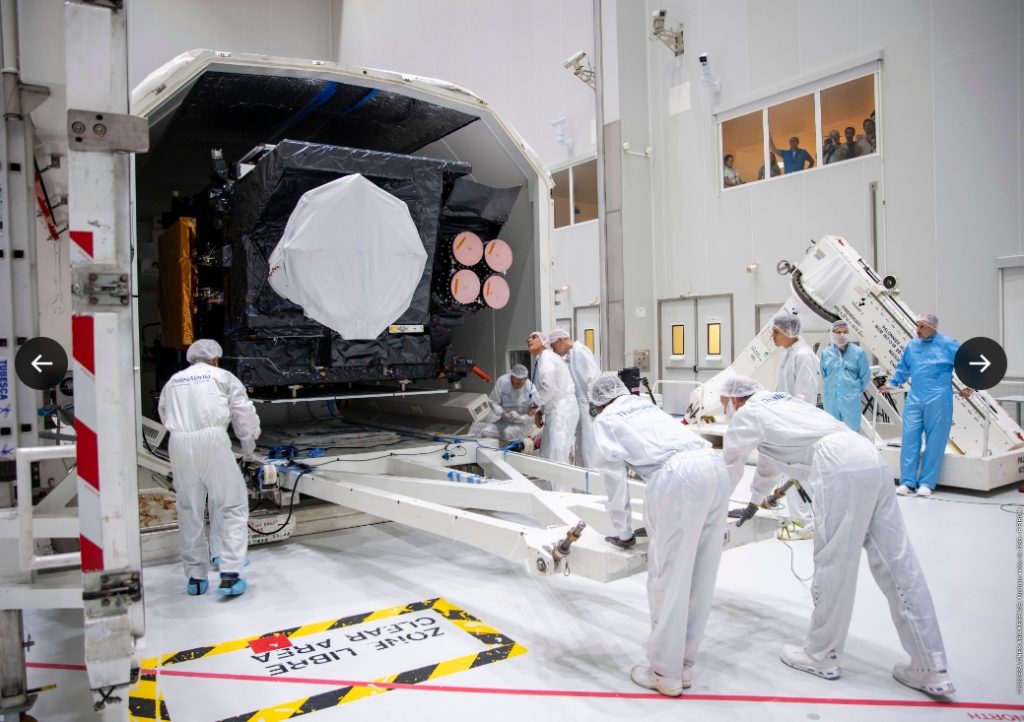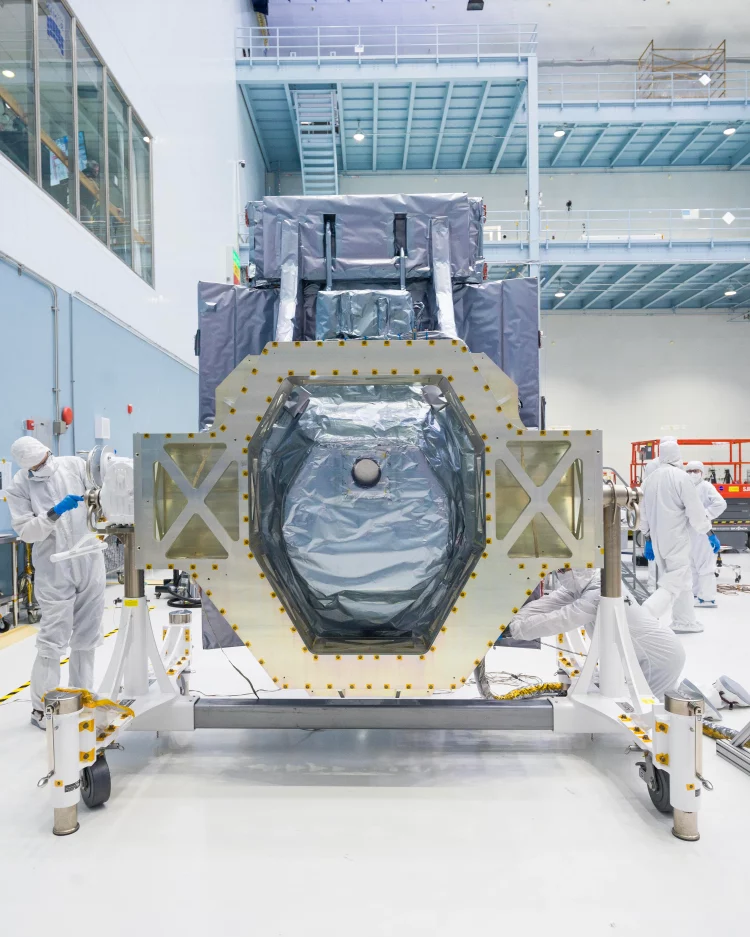Introduction
The arrival of the primary instrument for NASA’s Roman Space Telescope at NASA Goddard Space Flight Center marks a significant milestone in the advancement of astronomical science and exploration. The Roman Space Telescope, officially named the Nancy Grace Roman Space Telescope (Roman Space Telescope), represents one of the most ambitious projects in modern space observatories. Its primary instrument, a state-of-the-art piece of technology, will play a crucial role in unraveling some of the universe’s most profound mysteries. This article provides an in-depth look at the importance of this instrument, the technologies involved, and the broader implications for space science and exploration.
1. Overview of the Roman Space Telescope
The Roman Space Telescope is named in honor of Dr. Nancy Grace Roman, a pioneering astronomer who was instrumental in the development of the Hubble Space Telescope. The mission of the Roman Space Telescope is to explore the universe in unprecedented detail, providing insights into the formation of galaxies, the nature of dark energy, and the search for exoplanets.
1.1 Mission Objectives
The Roman Space Telescope aims to address several key scientific questions:
- Dark Energy: One of the primary goals is to understand the nature of dark energy, which is thought to be driving the accelerated expansion of the universe.
- Galaxy Formation: The telescope will study the formation and evolution of galaxies, helping to explain how these vast structures have developed over cosmic time.
- Exoplanet Discovery: The Roman Space Telescope will also search for exoplanets, particularly focusing on those that might have conditions suitable for life.
1.2 Scientific Goals
The Roman Space Telescope is expected to make groundbreaking discoveries by:
- Mapping the distribution of dark energy across the universe.
- Providing detailed images and data on the structure and composition of galaxies.
- Identifying and characterizing a large number of exoplanets, including those in the habitable zone of their host stars.
2. The Primary Instrument: An Engineering Marvel
The primary instrument for the Roman Space Telescope is a sophisticated piece of technology designed to support the telescope’s scientific goals. This instrument includes the Wide Field Instrument (WFI), which is crucial for the telescope’s ability to conduct large-scale surveys and detailed observations.
2.1 Instrument Specifications
The WFI is equipped with several advanced features:
- Wide-Field Imaging: The WFI boasts a large field of view, allowing it to capture expansive regions of the sky in a single image. This capability is essential for mapping the distribution of dark energy and studying the structure of galaxies.
- High-Resolution Sensors: The instrument includes high-resolution sensors that provide detailed images of celestial objects, facilitating the study of their physical properties and behavior.
- Advanced Detectors: The WFI employs cutting-edge detectors that enhance its sensitivity to faint astronomical signals, enabling the detection of distant galaxies and exoplanets.
2.2 Technological Innovations
The development of the primary instrument incorporates several technological innovations:
- Custom Optics: The WFI features custom-designed optics that ensure precise imaging and accurate data collection. These optics are engineered to minimize distortions and aberrations.
- Thermal Control Systems: Given the extreme temperatures of space, the instrument includes sophisticated thermal control systems to maintain optimal operating conditions and prevent damage from thermal fluctuations.
- Data Processing Capabilities: The WFI is equipped with advanced data processing capabilities that allow for real-time analysis of the data collected, improving the efficiency of scientific operations.
3. The Journey to NASA Goddard
The arrival of the primary instrument at NASA Goddard Space Flight Center represents a critical step in the preparation for the Roman Space Telescope’s launch. The journey of this instrument from its manufacturing facility to NASA Goddard involved meticulous planning and coordination.
3.1 Transport and Handling
Transporting the primary instrument required careful handling and specialized equipment:
- Transport Vehicle: The instrument was transported using a custom-built vehicle designed to protect it from vibrations and shocks during transit.
- Environmental Controls: Throughout the journey, environmental controls were maintained to ensure that the instrument remained at the appropriate temperature and humidity levels.
3.2 Arrival and Integration
Upon arrival at NASA Goddard, the primary instrument underwent a series of integration and testing procedures:
- Integration with the Spacecraft: The instrument was carefully integrated with the spacecraft’s other components, including its power systems and communication equipment.
- Preliminary Testing: Initial testing focused on verifying the instrument’s performance and ensuring that it met all operational specifications.
4. Testing and Calibration
Before the Roman Space Telescope is launched, the primary instrument must undergo extensive testing and calibration to ensure its readiness for space operations.
4.1 System Verification
System verification involves a series of tests to confirm that the instrument functions as expected:
- Functional Testing: Engineers perform functional tests to check the instrument’s various components, including its imaging systems, detectors, and thermal control systems.
- Performance Evaluation: The performance of the instrument is evaluated under conditions that simulate the space environment, ensuring that it will operate effectively once in orbit.
4.2 Calibration Procedures
Calibration is essential to ensure the accuracy of the instrument’s measurements:
- Optical Calibration: The optical systems are calibrated to correct for any distortions or aberrations, ensuring high-quality imaging.
- Detector Calibration: The detectors are calibrated to optimize their sensitivity and accuracy, allowing for precise data collection.
5. Scientific Implications and Future Prospects
The successful deployment and operation of the primary instrument on the Roman Space Telescope will have profound scientific implications and open new avenues for exploration.
5.1 Advancing Our Understanding of Dark Energy
One of the key scientific goals of the Roman Space Telescope is to advance our understanding of dark energy. By mapping the distribution of dark energy and studying its effects on the expansion of the universe, the telescope could provide insights into one of the most fundamental mysteries in cosmology.
5.2 Exploring Galaxy Formation
The detailed images and data collected by the WFI will enhance our knowledge of galaxy formation and evolution. Understanding how galaxies form and evolve over cosmic time will shed light on the processes that shape the universe.
5.3 Searching for Exoplanets
The Roman Space Telescope’s search for exoplanets will contribute to our knowledge of planetary systems beyond our own. Identifying and characterizing exoplanets, especially those in the habitable zone of their host stars, could provide clues about the potential for life elsewhere in the universe.

6. Collaboration and Community Engagement
The Roman Space Telescope mission involves collaboration with various partners and engagement with the scientific community and the public.
6.1 Collaborative Efforts
NASA collaborates with other space agencies, research institutions, and universities to support the mission:
- International Partnerships: Collaborations with international space agencies and research organizations enhance the mission’s capabilities and extend its scientific reach.
- Research Institutions: Partnerships with research institutions provide valuable expertise and resources for analyzing data and conducting follow-up studies.
6.2 Public Outreach and Education
The Roman Space Telescope mission also engages the public through outreach and education efforts:
- Educational Programs: NASA offers educational programs and resources to help students and educators learn about the mission and its scientific goals.
- Public Events: Public events, such as lectures and online forums, provide opportunities for the public to learn more about the mission and its progress.
7. Looking Ahead: The Road to Launch
As the primary instrument undergoes final preparations at NASA Goddard, the focus shifts to the final stages of the mission’s development.
7.1 Launch Preparations
Preparing for launch involves finalizing the integration of the primary instrument with the spacecraft and conducting final tests to ensure everything is ready for space operations.
7.2 Mission Timeline
The timeline for the Roman Space Telescope mission includes key milestones such as the launch date, deployment in space, and the commencement of scientific operations. The mission team will closely monitor progress and make any necessary adjustments to ensure a successful launch and mission execution.
Conclusion
The arrival of the primary instrument for NASA’s Roman Space Telescope at NASA Goddard represents a significant achievement in the preparation for one of the most ambitious space missions of our time. This advanced instrument will play a crucial role in the telescope’s ability to explore the universe, unravel the mysteries of dark energy, study galaxy formation, and search for exoplanets. As the mission progresses toward launch, the scientific community and the public eagerly anticipate the groundbreaking discoveries that the Roman Space Telescope will bring. With its state-of-the-art technology and ambitious goals, the Roman Space Telescope promises to expand our understanding of the cosmos and inspire future generations of scientists and explorers.











































Discussion about this post